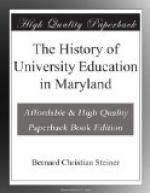This university extension method claims to be an advance on existing systems partly because under no circumstances does it ever give lectures unaccompanied by a regular plan of reading and exercises for students. These exercises moreover are designed, not for mental drill, but for stimulus to original work. The association of students with a general audience is a gain to both parties. Many persons follow regularly the instruction of the class who have not participated in the exercises. Moreover, the students, by their connection with the popular audience, are saved from the academic bias which is the besetting sin of teachers: more human interest is drawn into the study. The same effect follows from the miscellaneous character of the students who contribute exercises. High university graduates, experts in special pursuits, deeply cultured individuals who have never before had any field in which to exhibit the fruits of their culture, as well as persons whose spelling and writing would pass muster nowhere else, or casual visitors from the world of business, or young men and women fresh from school, or even children writing in round text,—all these classes may be represented in a single week’s work; and the papers sent in will vary in elaborateness from a scrawl on a post-card to a magazine article or treatise. I have received an exercise of such a character that the student considerately furnished me with an index; I remember one longer still, but as this hailed from a lunatic asylum I will quote it only for illustrating the diversity of the spheres reached by the movement. Study participated in by such diverse classes cannot but have an all-roundness which is to teachers and students one of the main attractions of the movement.
But we shall be expected to judge our system by results: and, so far as the unit courses are concerned, we have every reason to be satisfied. Very few persons fail in our final examinations, and yet examiners report that the standard in university extension is substantially the same as that in the universities—our pass students being on a par with pass men in the universities, our students of ‘distinction’ reaching the standard of honors schools. Personally I attach high importance to results which can never be expressed in statistics. We are in a position to assert that a successful course perceptibly influences the tone of a locality for the period it lasts: librarians volunteer reports of an entirely changed demand for books, and we have even assurances that




